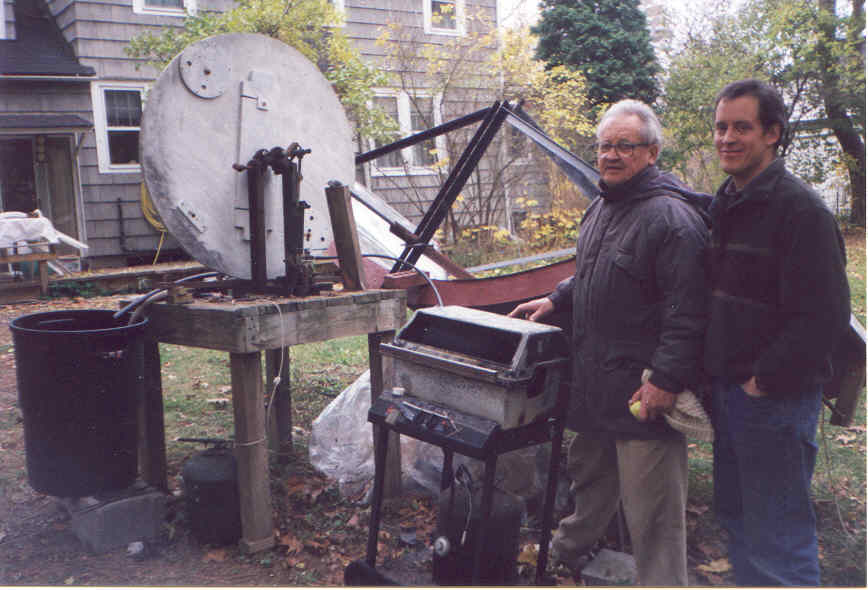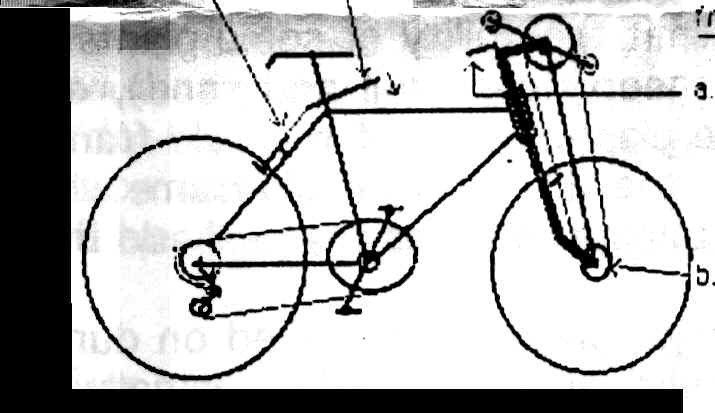
As part of our backyard demonstration of appropriate
technology, we have constructed and tested a dual-source steam engine and
water pumping system. A wood-fired steam boiler has been added to
the previously existing solar powered system, so that the engine and pump
can be run either by the solar parabolic trough collector when there is
sunshine, or else by wood-burning when there is no sun.
This system will allow us to demonstrate the pumping capability
of the system regardless of the weather or even after dark, provided of
course that it is not so cold that the water in the pump has frozen.
Visitors will be interested to see both the engine and the pump in operation,
since they both demonstrate the possibility of building low-tech, non-human-powered
machines from simple, locally available plumbing parts. The system
can also make the use of steam-powered pumping more versatile in the field,
in areas where a modest amount of firewood can be taken from the surrounding
area without contributing to deforestation. This is because users
of the system can operate it on solar power whenever possible, but still
have the use of the pump when sufficient sun is not available, by burning
wood or other biofuels.

Jaroslav Vanek (l) and Francis Vanek demonstrate the
dual source steam engine and pump. Wood burned in the recycled barbecue
boils steam from an empty gas cylinder (inside barbecue compartment), which
drives steam engine and piston pump (out of view behind large white flywheel),
which in turn pumps water out of black bin and back in. Solar collector
waits for sun (!) in background.
Despite its reputation as a cloudy city, the warm season
in Ithaca was actually very good for cooking with the sun this year, with
sufficient sun for cooking on roughly two days in three. This may
have to do with the generally drier conditions prevalent in the northeastern
US now: locally we have had 30 inches of rain through November compared
with an average of 35 inches.
With our busy schedule we focused mainly on cooking of
bulk foods: grains (especially rice), beans and pulses, and root vegetables.
We also did make an occasional casserole or loaf of bread. Approximate
totals for the year were 35-40 pots of rice, 8-10 pots of beans-pulses-potatoes,
and 5 casseroles and breads. A few notables: the cookers performed
well in intermittent sun and cumulus clouds, they were able to maintain
a constant enough temperature to cook effectively; in clear conditions
in the longest days (June and July), we were able to cook two dishes back-to-back;
and we learned how to use the reflective cone as a rain protector by taking
it off and placing it upside-down on the box, so that the whole unit could
be easily covered with a waterproof tarp or sheet of plastic.
The eight-sided panel we introduced last year appears
to improve performance, though this has not been tested scientifically.
As shown in the illustration, although the total cross-sectional area of
the cone is slightly reduced, light in the corners is reflected directly
into the oven, so that overall insolation increases.
Figure: top view of solar oven, showing old 4-sided cone design (l), and new 8-sided cone design (r).
Coming up for the further design evolution of the solar
cooker is the recycling of discarded barbecue stands into solar oven stands
(i.e. the ones on wheels with shelves on either side for holding dishes).
Removing the barbecue unit from such a stand and mounting the oven in its
place would provide a convenient way to move the cooker, keep it at a convenient
height above the ground, and provide shelves for putting dishes down on
their way in or out of the oven.
We also improved our larger community-size oven (dimensions
1m x 1m) this year, by adding a sealed hinge door and oven-racks with an
adjustable slope. The oven racks were recycled out of a conventional
discarded oven, so this provides a good way to keep a usable item out of
the waste stream.
The Superbike patenting procedure seems to be nearing
completion. The responsible official in the Prague patent office
informed us that the necessary papers and documents have reached his desk
[after three years] and that they are at or near the top and thus should
be acted on very soon.
Perhaps more promising in the short run is the production
of our solar ovens. Many Czech families have country cottages without
electricity and with fairly simple cooking facilities, and some have indicated
interest in our solar oven after seeing us use the oven in cooking rice
or baking a chicken. With a friend living in our village we have
developed a production facility to produce the ovens for local use, with
very simple tools and instruments. The only mechanical tool is a versatile
electric circular hand saw permitting other than vertical cuts.
This year we increased the size of the STEVEN website
and also added many new pictures and diagrams to help viewers become familiar
with the technologies. Taking the existing STEVEN prospectus (1997,
third edition), we updated the text where necessary, and then put text,
diagrams, and photographs in the website. We would eventually like
to put text and diagrams for our complete construction manuals in the website
in a form that is easy to download. Note: if any reader has experience
with this and would like to help, please do contact us!
In a related matter, we have been considering how we might more
effectively use the internet to promote appropriate technologies, and in
April, Francis drew up a brief proposal outlining the project, which can
be found in the website. We are looking for prospective partners
to work on this project.
The address for the website is:
www.virtualithaca.com/francis/stevenhomepage.html
We would be grateful for any feedback you may have; this can be sent
to francisvanek@yahoo.com.
In June we undertook the most physically demanding
test yet of the superbike (bicycle with legs driving rear wheel and arms
driving front wheel, using separate chain drive). Francis rode it
uphill from the village of Varna outside of Ithaca to the top of Mt. Pleasant,
a climb of some 500 vertical feet, much of it on very steep roads.
The specific superbike used had a fixed gear in back and gearshift in front,
so it was a cycle that ordinarily would be very difficult to pedal up a
steep hill without walking. Francis was able to ride up the hill,
stopping twice to rest, which showed the difference that the additional
power from the arms makes.

Diagram of Superbike
The STEVEN Foundation had two opportunities this year
to demonstrate solar technology (the solar oven in this case), both in
Ithaca. The first was a solar symposium held in honor of the opening
of the solar photovoltaic (PV) system on top of the Tompkins
County library in downtown Ithaca (www.tcpl.org) in June. For
that event, we baked bread rolls using an oven set up next to the sidewalk
outside the symposium venue, and talked about the work of the Foundation
with numerous attendees and passers-by. Then in September we participated
in the 10th Anniversary of the Ecovillage
at Ithaca, a local cohousing community, by demonstrating the use of
a solar oven for baking nachos. The enthusiasm with which visitors
greeted the use of solar energy for cooking made clear the desire for clean
technologies that really work.
We continue to handle various requests for information
from across the US and around the world, mostly unsolicited, suggesting
that the international grapevine continues to spread the word about our
work on appropriate technology. We have also been providing technical
information
to individuals actively involved in building technologies using STEVEN
designs in California (icemaker), Iran (parabolic trough water heating
using thermosiphon), India (parabolic trough for steam power), and Zambia
(parabolic trough). Increasingly this correspondence is taking on
the use of email and the internet, and we hope that by gradually adding
more details and interactivity to our website, we may be able to more efficiently
support from a distance the building of the technologies.
A great deal has been written already regarding the
events of September 11th, so it may seem redundant to once again call attention
to them in this newsletter. However, these events are directly connected
to the difficult situation in developing countries today. Since these
circumstances are the focus of much of our work, we feel that it is worth
making some reference to them here.
First, we share in the grief felt by people everywhere
dedicated to justice and the betterment of world in the aftermath of these
events. They have drawn our attention not only to the plight of the
bereaved here in the US, but to the poverty in many countries of the Middle
East, including Afghanistan. We do not believe in any way that the
existence of imbalances in the distribution of wealth and poverty justifies
indiscriminate violence carried out arbitrarily against people who happened
to be present in the World Trade Center. However, we can see that
reductions in the level of misery in these countries can reduce the risk
of such attacks, since the motivation for such hatred will be reduced.
If we wish to understand human misery, we can see that
it stems in part from the poor condition of the natural environment that
surrounds the people in question. This environment is not adequate
to provide for these people. When they do not have sufficient clean
water, or adequate agricultural land to feed themselves, hunger and discomfort
are the result. Here AT can help to improve conditions: for example,
cooking with the sun can reduce firewood consumption, and thereby allow
forests to grow back.
Actions taken in the industrialized countries can help
as well. In our current global order, it is the rich countries which
benefit the most from practices that degrade the environment, while it
is the third world that suffers the most, because, paradoxically, lack
of wealth in these latter countries means that their citizens can least
afford to protect themselves from the outcome of negative trends such as
global warming. Take the devastation caused by Hurricane Mitch in
Honduras: the combination of more intense hurricanes and ever larger numbers
of people pushed to a marginal existence is a recipe for disaster in terms
of ever increasing human suffering. As a response, many of the same
practices we advocate for developing countries apply in the wealthy countries
as well: for example, using solar energy for cooking or electricity reduces
consumption of fossil fuels and emissions of greenhouse gases, and thereby
helps the environment.
Thank you to Oliver Habicht of Ithaca for providing advice on working with IT systems at the Foundation. Oliver is a long-time family friend and is the System Support and Design Specialist in the Kroch Library at Cornell University.
Manuals and videos: the following materials are available on an ability-to-contribute basis from the STEVEN Foundation:
· Manuals: parabolic collector, steam engine, shallow-well pump,
hydraulic pump, solar oven.
· Videos: overview of STEVEN technologies, instructions for
shallow-well hand pump
Please write or email for more information. STEVEN is a registered 501-c-3 nonprofit. All donations are tax-deductible, and are used to help disseminate sustainable technology.